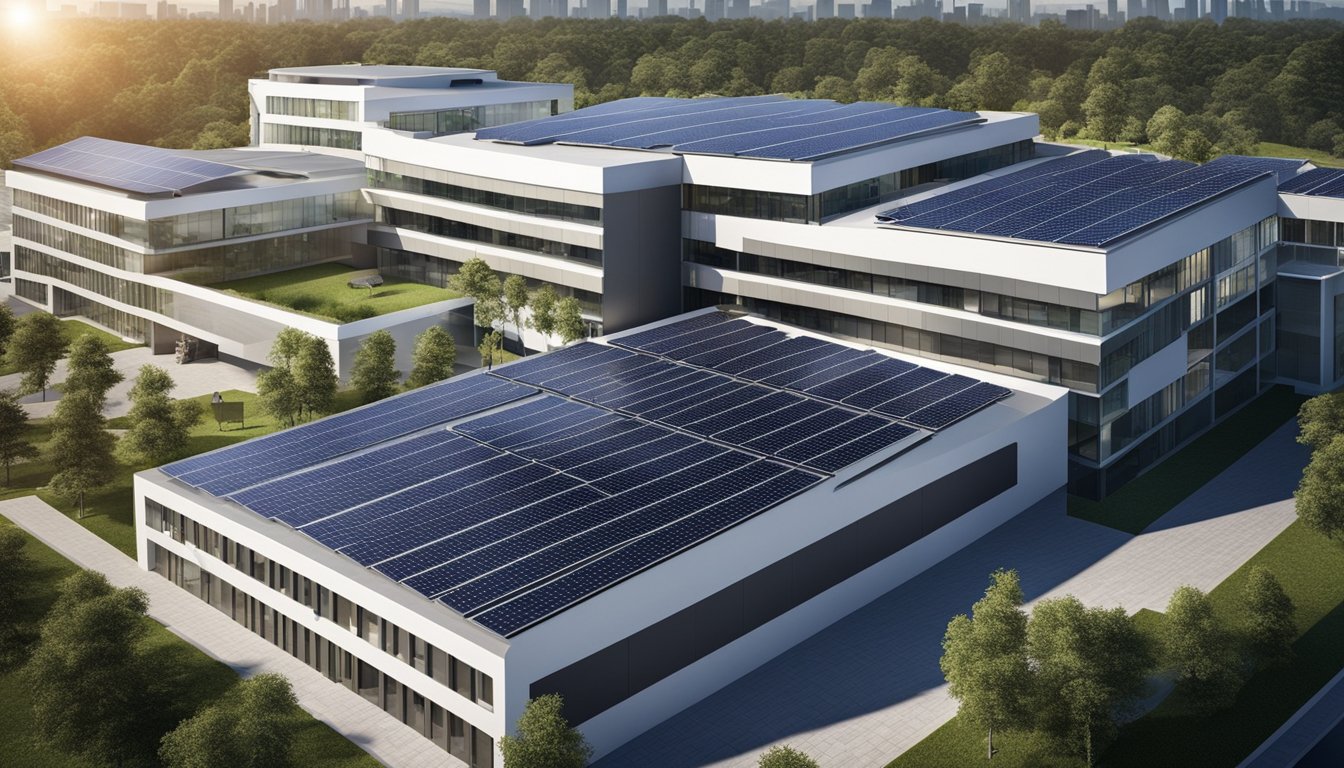Late updated: 24 Sep 2024 14:09
Written by: Amber Collins
Energy-Saving Tips For UK Businesses: Boost Efficiency and Cut Costs
Reducing energy consumption is more critical than ever for businesses across the UK. With energy bills soaring and sustainability becoming a core value, businesses must find ways to be more energy efficient. Adopting energy-saving practices not only lowers costs but also contributes to a greener environment, presenting a win-win for economic and environmental goals.

Our businesses, large or small, can benefit from assessing current energy usage and implementing strategies to cut down on waste. This might involve regular maintenance of HVAC systems, upgrading to energy-efficient machinery, or encouraging a work-from-home culture to reduce office energy usage. Investment in these areas can often lead to savings between 5% to 40%, optimising resources and improving bottom lines.
There's a variety of government-approved energy-efficient products available, designed to ease the transition towards sustainability. By appointing a green champion or a dedicated team to lead the charge, and by leveraging technology, we can foster a culture of energy efficiency. These measures empower us to make informed decisions that are both economically and environmentally sound.
Key Takeaways
- Assess your business's energy usage regularly.
- Implement efficient strategies and invest in technology.
- Foster a culture of sustainability in the workplace.
Assessing Energy Usage in Your Business
To efficiently manage energy costs and consumption, it's essential to first understand how energy is used within the business. Conducting an energy audit and utilising smart meters and thermostats are crucial steps in this assessment process.
Conducting an Energy Audit
An energy audit is the cornerstone of identifying opportunities for improving energy efficiency. Our goal is to systematically analyse how energy is consumed across various operations. Start by collecting data on all energy-consuming devices and processes. We need a comprehensive inventory, which includes lighting, HVAC systems, and equipment.
Engaging with energy professionals can provide deeper insights. They typically offer an evaluation of patterns in energy consumption and potential inefficiencies. The audit will highlight areas where energy is being wasted and recommend actionable steps to address these inefficiencies.
We can categorise audit actions into quick fixes, like sealing leaks, and long-term investments, such as upgrading to high-efficiency machinery. This process not only reduces our environmental impact but can also significantly cut energy costs, improving the bottom line.
Implementing Smart Meters and Thermostats
Smart meters and thermostats offer precise control and monitoring of energy use in real time. By implementing smart meters, we gain detailed insights into when and how electricity is consumed. This data helps us to identify peaks in usage and plan operations accordingly.
Smart thermostats provide additional capability by adjusting heating and cooling based on occupancy and weather conditions. We can programme them for different zones within the building, ensuring each area maintains optimal energy efficiency. This leads to increased savings and improved comfort for employees.
Integration with smartphone apps allows us to remotely manage settings, providing flexibility and control. Enhanced monitoring and management result in a more energy-efficient environment, assisting in reducing overall operational costs.
Energy Efficiency Strategies for the Workplace

In the workplace, energy-saving measures can include improving insulation, optimising lighting, efficient use of office equipment, and encouraging responsible behaviour. These steps help reduce energy consumption, lower costs, and minimise the carbon footprint.
Improving Insulation and Heating Controls
Effective insulation is crucial for maintaining a stable temperature in our office environments. By ensuring proper insulation materials are in place, we can prevent heat loss during colder months and keep our workplaces comfortable. Draught-proofing windows and doors also plays a significant role in enhancing thermal efficiency.
Heating controls are another important aspect. Using programmable thermostats or smart meters, we can automate and optimise temperature settings, reducing unnecessary heating when spaces are unoccupied. Space heating is often a major energy expense, so programmable thermostats are helpful in reducing this cost.
For air conditioning, regular maintenance ensures it runs efficiently. Adjusting the thermostat settings by just a degree or two can lead to significant savings over time. Energy-efficient air conditioning systems can also be a worthwhile investment.
Optimising Lighting and Office Equipment
Switching to energy-efficient lighting options like LED bulbs or compact fluorescent lamps (CFLs) significantly reduces electricity consumption. These bulbs use less energy and last longer than traditional incandescent bulbs. Maximising the use of natural light by positioning workspaces near windows can further cut down on lighting costs.
Office equipment should be optimised for energy efficiency. Power strips with surge protectors help minimise standby power usage by electronics. Ensuring computers, printers, and copiers have energy-saving settings enabled will further reduce consumption.
Energy-efficient office practices include encouraging remote working when possible. This not only reduces energy usage in the office but also benefits employees' work-life balance.
Reducing Energy Waste Through Behavioural Changes
Changing our behaviour plays a crucial role in energy efficiency. Encouraging staff to switch off lights and office equipment when not in use is fundamental. We can also promote sustainable practices, like reducing paper usage, recycling, and composting.
Implementing an energy awareness programme can help staff understand the impact of their actions on energy consumption. Frequent reminders about simple energy-saving habits can foster a culture of responsibility. Over time, these small changes add up to substantial savings and a reduced carbon footprint for the organisation.
Frequently Asked Questions

We address several key concerns about enhancing energy efficiency within UK businesses. Specific strategies, application processes for grants, and effective measures in various sectors like factories illustrate ways to significantly cut down energy consumption and costs.
What are the best strategies for improving energy efficiency in UK businesses?
To enhance energy efficiency, UK businesses can invest in government-approved energy-efficient products and conduct regular maintenance on systems like HVAC. These strategies can reduce energy usage significantly.
How can UK businesses apply for energy efficiency grants?
Businesses in the UK can apply for energy efficiency grants through government schemes. Checking eligibility and preparing necessary documentation is crucial. Various programmes offer financial support for adopting new energy-saving technologies.
What initiatives can be implemented at work to reduce energy consumption?
Simple initiatives include adjusting temperature settings on freezers and refrigerators and ensuring equipment is turned off when not in use. Employees can be encouraged to follow energy-saving practices regularly.
Which measures are most effective in reducing heating costs for UK companies?
Using improved insulation in buildings and regularly maintaining heating systems are effective measures. These practices not only reduce heating costs but also contribute to a more sustainable work environment.
How can factories in the UK adopt energy-saving measures?
Factories can optimize machinery operations and employ energy management systems. Using energy-efficient technologies tailored for the specific industry is also recommended to enhance energy savings.
What is encompassed in the UK's energy efficiency strategy for businesses?
The UK's energy efficiency strategy includes guidance on reducing emissions while maintaining business performance. It offers resources for evaluating energy consumption and implementing cost-effective changes to achieve sustainable operations.
